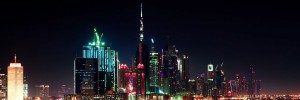By Mishaal Al Gergawi, Special to Gulf News www.gulfnews.com
I stood on a chair in the Rivington Grill at Souq Al Bahar across the fountain pond from the Burj to see the fireworks which shot up higher than my neck allowed me to see; it was breathtaking, period.

As objective as one aims to be there is something incredible about witnessing the tallest tower in the world being unveiled in your home town. I watched the Burj rise over the last five years from my house; I live across the street from the Burj in Jumeirah just by Safa Park.
When it was announced, though aesthetically more thought out, it was hard to imagine how the area which for so long was known as ‘The Central Military Command’ was going to house this tower of towers. Ever wonder why the first interchange is still referred to as the ‘Defence Roundabout’?
And so I watched, but with varying attention, that which would eventually become Burj Khalifa.
I will disagree with the premise of building the world’s tallest tower and will propose another, more relevant, premise. Many have sighted the Burj as a sign that Dubai is ‘here’ and that it’s a demonstration that it is ‘open for business’. Call me undramatic, but I think this message has been consistently conveyed over the past three decades.
In an attempt to maintain objectivity, I think the only reason one would build the world’s tallest tower is to demonstrate know-how, not attract PR. Any group, public or private, in any part of the world would welcome Emaar today with open arms to partner in developing property; this to me is why I’d build the Burj Khalifa.
It is not for vanity, it is for capacity. In other words, a proven propensity to deliver highly complex projects in one of the most challenging environments (there were various challenges that were global, specific to Dubai and also to Emaar).
This tower is the ultimate credential that makes Emaar a sought-after business partner around the world. That, ladies and gentlemen, is how brands are built; with a track record.
However, there is another Burj that was erected and un-erected during the course of the five-year construction period. I read in various publications and documents that 12,000-16,000 labourers were involved at one point or another in the construction of the tower.
Every time I would read those numbers, the same visual would come to mind: the shape of the Burj constructed of men in blue overalls on top of each other; those men are the ones who built the tower. Architects design, civil engineers draw plans, site engineers supervise, foremen give orders, but it is the labourers who actually build structures.
Tough questions
Next time you hear someone casually say, “I was involved in building the Burj”, look them in the eye and say: “exactly how”? No one remembers the men who built the Sears Tower, the Empire State Building, the Petronas towers and the Taipei 101 … or the Burj Khalifa.
I wrote on this subject in May 2008 and January 2009. It is now January 2010 and though I’ve read about some regulations and general admissions I have yet to see tangible action on the labour issue.
In our endeavour to be recognised as a global city, which is still the reasoning behind building the Burj, we must address it all: the fabulous and the dull, the impressive and the embarrassing, the high and the low.
Dubai remains an important commercial centre for places as far as central Asia and many parts of Africa. However, in its pursuit of global recognition, Dubai must recognise that the scorecard is more than just world-class infrastructure and a business-friendly climate.
It is made up of outstanding health care institutions, an innovative educational system that promotes thinking rather than memorising, a vibrant cultural identity that is supported by local (not only Emirati) artistic production, time efficient and affordable business set-up solutions (yes, deregulatation) for entrepreneurs, a case by case approval process for awarding long-term residences and, last but not least, the enforcement of human rights for labourers.
We should not, cannot and will not accept the harsh conditions by which labour agents hire these desperate young men from their countries, nor the way the local contracting companies treat them.
The solutions are easy: 1) Do away with the agents by setting up recruitment offices in those countries directly. The Ministry of Labour or an approved agency could do this.
2) Continuously inspect and penalise contractors who do not provide adequate food and accommodation as well as health and safety measures; the exact meaning of the adjective ‘adequate’ should not be left for interpretation.
3) Contractors who do not show proof of funds that allow them to make good on their commitments to their labour workers would be unable to bid for contracts; if contractors live off developers from job to job and their operation is paralysed in between, they should merge with other contractors.
We have a choice of either remaining a commercial centre or making the necessary commitments that are required towards becoming a civil society with global contributions. The world is watching. Our move.
Mishaal Al Gergawi is an Emirati commentator on socio-economic and cultural affairs in the UAE.













